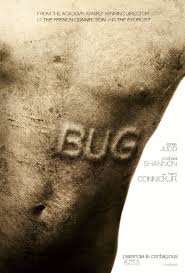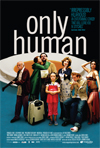JARHEAD
BIG THUMBS UP FILM REVIEW RATING!
Oh the contorversy! This film has generated some heated discussions (more like insults) at the Internet Movie Data Base (IMDB) site. I won't delve into the name-calling depths that some "reviewers" have dug themselves into. But I will say that this a very engaging and suprisingly good film. Whether or not you think it "insults Marines" will depend, I'm sure, on if you've ever been in the Armed Forces or have family members who are. But if you're willing to sit back and enjoy a film without wearing any political affiliations on your sleeve, you're likely to be quite taken with JARHEAD (Review Below):
There's a lot to love about JARHEAD, but there's an underlying current, too, that may effect some viewers negatively (specifically those that have been or are Marines.) Myself never having been in the U.S. Armed Services, I can't make those glib comparisons that others who've "been there and done that" might be able to. But what I can do is rate this film on its own merits and tell you why I gave it such a high rating.
Like Sam Mendes' other film, AMERICAN BEAUTY, which delves into the depths of suburbia and all its great and terrible significance, Mendes here takes hold of a U.S. Marine and shows us an excellent character study. But this time it's of a young man's ultimate genesis into a fighter.
Jake Gyllenhaal (DONNIE DARKO and OCTOBER SKY) is Anthony Swofford, a naive recruit with dreams of glory and medals, a dedicated American protector who takes his lumps during his early time in "The Suck" (the Marine Corps unofficial title given to it by the grunts). He rises to the station of a Marine Scout-Sniper along with Troy, Peter Sarsgaard (FLIGHT PLAN and KINSEY). And above them is Staff Sergeant Sykes, Jamie Fox (RAY), who "loves The Corp" and will never leave it.
As Swofford makes it through boot camp and into the lower echelon of a Marine trained combatant, he is very willing, ready and extremely able to kill whenever the order comes.
But what if it doesn't? This is the crux of the film.
I've heard a lot of gossip about JARHEAD before its release, and many have damned it for a message that I simply did not see, that being the making of a political statement or "bashing" the Marine Corp. On the contrary, I think Mendes held back on this point and skillfully allows the viewer to insert their own beliefs (if you lean one way or the other - pro-War vs. ant-War). And that's War with a capital "W". Because, let's be honest, that is what our Armed Services are trained for. They are trained to kill during wartime. And each man/woman brings with them their own justifications for this (be it "In protection of my country" or "Because my father was a Marine" or "Because it was this or jail.")
This film focuses on the relationship that Swofford develops with the Marine Corp and within himself. He is given the right tools (both psychologically and physically) to exterminate the enemy. He is beat down by his instructors and built back up into a killing machine ("This is my rifle. There are many like it but this one is mine..."). He's loaded with adrenaline as they enter Iraq for Operation Desert Shield. But the days start to drag and he begins to wonder if he'll ever see any action and get to do what he was designed for (sharpshooting). Boredom sets in, and with it comes resentment and anger directed at everyone (even men in his own platoon). But then a mortar attack on their outpost occurs. Slow motion blasts of sand cover Swofford's face, a sort of baptism into the War. He wets himself during this scene, but whether it's from excitement or fear is left up to the audience (I personally loved that part, as it might be perceived as another type of baptism.)
Then we see Swofford and his platoon moving into the desert as they witness the burning of the Kuwait oil fields. They go into this muck and the feel of the film turns as dark as the petrol spilling from the infernal wells. Are they in Hell?
My initial perception was that something bad was coming. But it never did.
There is no "War" to speak of for Gyllenhaal's character. We never see a speck of enemy blood on-screen. No head splatters or bullet-riddled chest shots. The war is "distant", beyond his reach, and you begin to feel his frustration. Why can't he just kill somebody? (This is especially noteworthy when they are given the opportunity but it is quickly taken away.)
All in all, this movie is a fantastic break from normal Hollywood form. There are no great external battles with dismembered bodies and the death of half the platoon. The battle here is compartmentalized into one man's struggle to find out what he's supposed to do as a killer when never given the opportunity to become one.
(There is a great feeling of dichotomy toward the end of the film when an obviously disenfranchised Vietnam Vet gets on-board the welcome home bus carrying the "victorious" Marines down Main Street; a "victory parade" that the Vietnam Marine never got.)
















0 Comments:
Post a Comment
<< Home